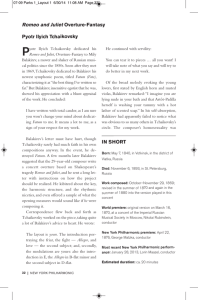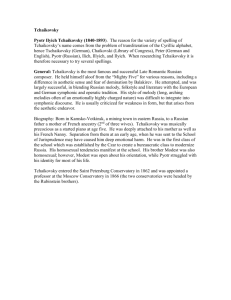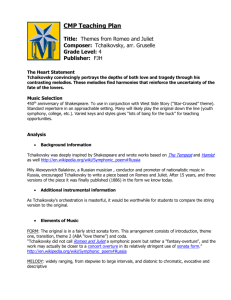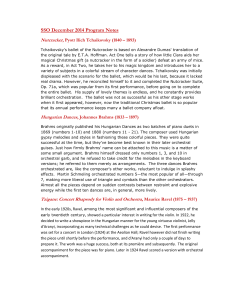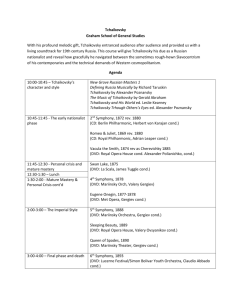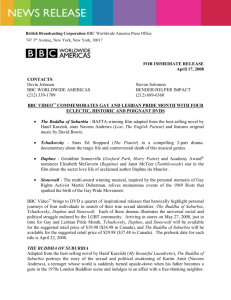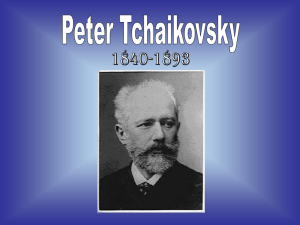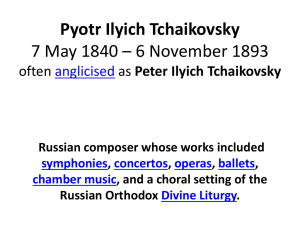Peter Ilich Tchaikovsky
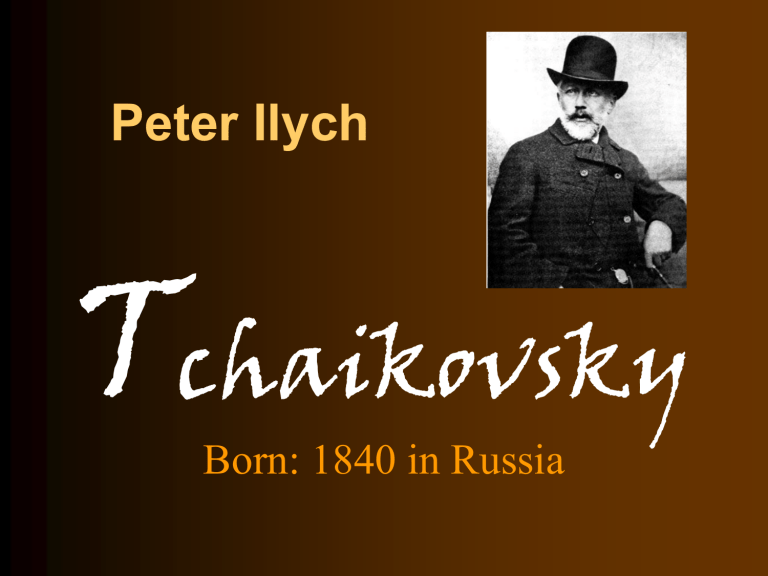
Peter Ilych
T
chaikovsky
Born: 1840 in Russia
Peter Ilych Tchaikovsky
Acknowledged as the greatest composer in Russia and one of the great composers in the world, Tchaikovsky was truly a composer for the people. His music reflected not only his own powerful emotions and his
Russian patriotism, but also his feelings that were (and are) common to all of humanity.
Tchaikovsky
In this story, we get a glimpse of his patriotism and his oversensitive heart.
As a boy growing up in Russia, he was seen by his nanny kissing the map of Russia, while spitting on the other countries in Europe.
When she reminded him that she was French, he replied in a sweet voice, “I covered France with my hand.”
Here is the house where
Tchaikovsky lived as a child in the city of Votkinsk.
A Picture of the
Tchaikovsky
Family in
1848. The composer is the boy standing on the far left.
Tchaikovsky
Tchaikovsky’s life was full of contrasts. He seemed to alternate between being a shy, modest person and a do-it-now and askquestions-later kind of attitude.
He often had trouble dealing with this double-sidedness, and as a result was very self-conscious. He tore up many compositions – he even wrote on one of them “Dreadful Muck”.
Tchaikovsky
Peter as a child
Peter Ilych was always a sensitive little boy. The slightest word of disapproval from his nanny would send him scurrying off to the corner for a long sulk. She called him “a porcelain child”, because she thought he was so emotionally fragile. As he grew older, Tchaikovsky developed this into an art. He became a master pouter. His music can be pretty weepy, too.
Listen to this portion of his
Symphony #6.
His brother nicknamed the symphony
“Pathetique.”
Why do you think Tchaikovsky developed such low self-esteem?
Tchaikovsky
• Tchaikovsky studied law and for a while was employed as a legal clerk for the government. There, he perfected the art of looking busy while doing very little. He didn’t begin to study music seriously until he was 21.
• He was a late bloomer, but he made up for it.
He once confessed that before he began studying at the St. Petersburg Conservatory, he didn’t even know how many symphonies
Beethoven had composed. But you do, right?
Romeo
and
Juliet
More info
Listen to two selections from
Tchaikovsky’s Romeo and Juliet fantasy. Common in the Romantic
Period was Program Music . Write the definition in the space provided.
•What do you think is happening in the first selection?
(Click to start each)
•What does the second represent?
1. Fighting 2. Love
Tchaikovsky
Peter accepted criticism with a positive attitude toward his improvement.
Once he took a composition he had worked very hard on to his teacher Anton
Rubenstein.
Tchaikovsky wrote of
Rubenstein’s reaction, “He said,
‘it was not for the development of imbeciles that he took the trouble to teach composition.’ I left the Conservatory full of gratitude for my professor."
Anton Rubenstein
Although he gained fame as a composer, he never had what it takes to be a good conductor, even of his own music.
He was always very nervous and had a morbid fear that his head might fall off in the middle of the piece.
So he propped it up with his left hand and conducted only with his right. True Story!
We don’t know how he turned the pages.
Tchaikovsky’s love life was, to put it bluntly, depressing.
As a young man he was deeply in love with an operatic soprano named Desiree Artot. They got engaged, but then she married someone else without any warning or communication whatsoever.
Desiree
Artot
Peter and Antonina
Later, one of his students, Antonina
Miliukova, declared her love for Peter, and he agreed to marry her out of pity.
He shouldn’t have bothered. The marriage was a disaster from start to finish and lasted all of nine weeks.
Tchaikovsky
In a fit of depression,
Tchaikovsky attempted suicide by jumping into the
River Neva, hoping to catch pneumonia.
Wouldn’t you know it, all he got was a terrible cold.
A wealthy admirer
That same year, 1877, was a good year in another respect though.
Tchaikovsky got a fan letter from a woman named Nadezhda von Meck, a 46 year-old widow with 11 children and more money than she knew what to do with. She thought it would be fun to have a composer that she could call her own.
Tchaikovsky
She agreed to send Tchaikovsky a regular allowance so that he could be free to spend his time composing.
Her only rather eccentric stipulation was that they should never meet.
They wrote letters back and forth all the time for 14 years, but never once met each other.
Assured of income from von Meck, Tchaikovsky wandered around
Europe composing. Since his music appealed to other Europeans, he was often considered a traitor by other Russian composers and many
Russian listeners. He lived mainly alone, avoiding social contact whenever possible.
However, once Tsar Alexander III of Russia conferred nobility and a lifelong pension to Tchaikovsky, all of that changed.
Tchaikovsky became a Russian hero for his attempts at
“universal unity with the West.”
He was able to move into this mansion, not far from Moscow.
His success earned him an honorary Doctor of
Music degree in England.
His success also carried him all the way to the United States, where he conducted his
Slavonic March at New York’s Carnegie
Hall on it’s OPENING NIGHT on May 5,
1891. Here is a crude sketch of Carnegie
Hall on opening night, illustrating how simply packed it was.
Tchaikovsky
Tchaikovsky died in 1893, a famous and successful man. He was said to have contracted Cholera from an unclean water glass.
Authorities claim that
Tchaikovsky took poison rather than be implicated in a political scandal.
Died: 1893 in St.
Petersburg,
Russia
On to the Listening Examples….
Tchaikovsky
Although today the Nutcracker Ballet is one of Tchaikovsky’s most popular compositions, in his lifetime it was a complete failure!
The
Nutcracker
You may know this piece from seeing it at
Christmas time, or from the movie Fantasia.
Now we will listen to the Chinese Dance from the Nutcracker. Please complete the top area on your listening sheet.
Click to start the music
1812 Overture
Tchaikovsky’s 1812
Overture is one of his most famous pieces. We often hear it performed in the
United States for
Independence Day, which leads some people to believe that it was written for the
American War of 1812, but it wasn’t. It celebrated
Russia’s defeat of Napoleon in 1812. This war happened
28 years before Tchaikovsky was born.
We will now complete the lower portion of the listening sheet. In this example from the
1812 Overture, you will hear a lot of bells – Tchaikovsky used these to represent the
Church Bells all over St.
Petersburg after the Russians had won a great battle against
Napoleon and his troops.
Then you’ll hear cannon fire, representing the fireworks and the victory celebration of the troops coming home.
(click to start music)
Tchaikovsky
The End
Romeo and Juliet
William Shakespeare
Return to presentation
Romeo and Juliet is a story about two young people who fall in love.
Unfortunately, they belong to opposing families that hate each other, the Montagues and the Capulets. The families are always fighting and disturbing the peace of Verona. Romeo and Juliet secretly get married and decide to run away together. In order for this plan to succeed, Juliet fakes her own death. She explains this all in a letter to Romeo, which he never receives. Upon seeing her
“dead,” Romeo takes poison.
When Juliet sees Romeo dead, she stabs herself.

